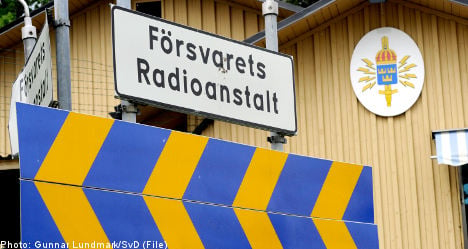According to the measure, both Sweden’s National Bureau of Investigation (Rikskriminalpolisen) and security service Säpo would have “limited” access to information collected by Sweden’s main signals intelligence agency.
Justice minister Beatrice Ask called the proposed changes “minimalistic”, but has nevertheless invited the Social Democrats into discussions over the measure.
Säpo has previously been able to use signals intelligence from FRA, but the security service’s ability to do so came to a halt with the 2009 passage of a controversial wiretapping law, which gave FRA permission to monitor telephone and internet traffic that crosses Sweden’s borders.
The government later launched an inquiry into how the law could be amended to provide Säpo with additional tools to combat terrorism.
Säpo has consistently pointed out that their work is hampered by not being able to have access to signals intelligence.
The inquiry, headed by ex-Säpo head Anders Eriksson, concluded that Säpo should be entitled to “order” signals intelligence from FRA.
The measure presented by the justice ministry on Thursday is less sweeping that the changes proposed by Eriksson’s inquiry in that it puts limits on exactly what Säpo could use the signals intelligence for.
“It is a a rather big difference, actually [from the inquiry’s findings],” Ask told TT.
“It is a minimalistic solution. Eriksson’s proposal expanded the possibilities so that these resources could be use to prevent crime. That’s not what we’re proposing.”
According to the justice ministry proposal, Säpo and the National Bureau of Investigation should have the ability to use signals intelligence to “map strategic circumstances with reference to international terrorism and other serious cross-border offenses that could be of threat to national interests”.
“It won’t be possible to hunt a specific individual,” said Ask.
The proposal follows the same rules that apply to the Swedish Armed Forces (Försvarsmakten) and the government which stipulate that the use of signals intelligence is only allowed in circumstances of a foreign nature and cannot be focused on a specific individual, or involve intelligence where both the sender and receiver are on Swedish soil.
Intelligence information is collected in an automated fashion and with the use of certain search terms. In the information is related to one specific person, it can only be used, which is only allowed in very serious circumstances, the individual is to be informed after the fact.
Ask has also abandoned the idea that some agency other than FRA should be responsible for collecting signals intelligence on behalf of the police.
She believes there will be a wide political agreement about the proposal and states that leaving signals intelligence in the hands of FRA is the best option.
“We have researched this in depth and established that keeping to the FRA is beneficial for many reasons, especially financially”, she said.
A departmental memorandum on the new measure has now been sent out for comment.


 Please whitelist us to continue reading.
Please whitelist us to continue reading.
Member comments